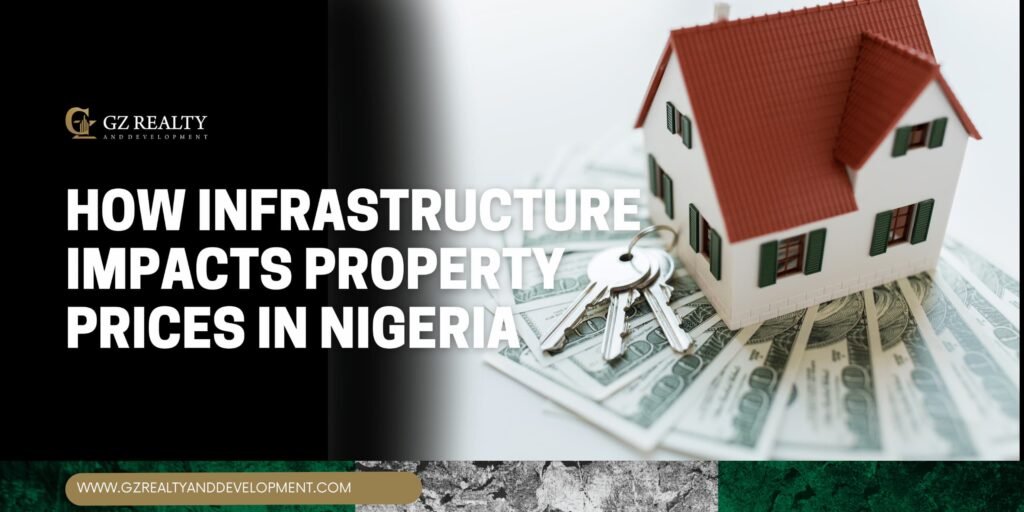When it comes to investing in real estate, one crucial aspect that often gets overlooked is infrastructure. Simply put, infrastructure refers to the basic physical and organizational structures needed for the operation of a society or enterprise.
In the context of Nigerian real estate, this includes everything from roads and public transportation to electricity, water supply, and more. Understanding how infrastructure impacts property prices can provide foreign investors valuable insights into potential investments.
Let’s explore this relationship in detail.
1. The Importance of Infrastructure
Infrastructure plays a pivotal role in shaping the real estate market. Well-developed infrastructure not only enhances the quality of life for residents but also increases the desirability and value of properties in the area.
For foreign investors looking at the Nigerian market, understanding the types of infrastructure that impact property prices is essential for making informed decisions.
2. Key Infrastructure Developments
Several types of infrastructure directly affect property prices in Nigeria:
- Transportation: Good road networks, railways, and airports facilitate easy movement of people and goods. Properties near major transportation hubs often see increased value due to their accessibility. For instance, areas around the Lagos-Ibadan Expressway have seen significant price hikes as the road improves connectivity.
- Utilities: Reliable access to electricity, water, and sewage systems is vital for any property. Areas with consistent utility services attract higher prices, while properties in locations with frequent outages or shortages tend to lose value.
- Telecommunications: In today’s digital age, access to reliable internet and mobile networks is essential. Properties in areas with strong telecommunications infrastructure are more attractive to buyers and renters, particularly in urban centers.
- Public Services: Schools, hospitals, and recreational facilities also influence property values. Areas with good schools and healthcare services are generally more desirable, leading to higher property prices.
3. Impact on Property Prices
The relationship between infrastructure and property prices is straightforward. Areas with robust infrastructure tend to see property prices rise, while those lacking essential services often struggle:
- Increased Property Values: When new infrastructure projects are announced—like a new highway or an airport—property values in the vicinity often spike. Investors see these developments as signs of growth, leading to higher demand and increased prices.
- Decreased Property Values: Conversely, if an area suffers from poor infrastructure—such as bad roads or inconsistent utilities—property values can plummet. Buyers and renters are less likely to invest in locations that don’t offer essential services, leading to stagnant or declining property prices.
4. Regional Differences
It’s important to note that infrastructure development varies across Nigeria. Major cities like Lagos and Abuja have seen significant investments in infrastructure, resulting in booming property prices. For example:
- Lagos: As Nigeria’s commercial hub, Lagos has experienced extensive infrastructure development, making it a prime location for property investment. The ongoing expansion of the Lekki Free Trade Zone and improvements to the road network are boosting property values in this region.
- Abuja: The capital city has seen substantial government investment in infrastructure, including new roadways and public transport systems. This has made Abuja an attractive option for foreign investors, with property values reflecting this growth.
- Port Harcourt: Known for its oil industry, Port Harcourt is also investing in infrastructure. New transportation links and improved utilities can significantly impact property prices here, providing opportunities for savvy investors.
5. Future Infrastructure Projects
Looking ahead, several major infrastructure projects are set to reshape the Nigerian real estate landscape. For instance:
- Railway Projects: The ongoing construction of new rail lines aims to enhance connectivity between major cities, likely increasing property values in areas served by these routes.
- Airport Expansions: Upgrades to existing airports and the construction of new ones can attract more visitors and businesses, making surrounding properties more desirable.
- Smart City Initiatives: With a focus on sustainable development, smart city projects aim to integrate advanced technologies into urban planning, which could significantly enhance property values in the long term.
Conclusion: Investing Wisely
In summary, infrastructure plays a vital role in determining property prices in Nigeria. As a foreign investor, understanding the infrastructure landscape can guide your decisions, helping you identify areas with high growth potential.
With ongoing developments and future projects on the horizon, now is an excellent time to explore opportunities in Nigerian real estate.
Ready to navigate the Nigerian real estate market with confidence? Reach out today to discover how we can help you find the best investment opportunities in regions poised for growth.
At GZ Realty, we specialize in connecting US citizens and African Americans with prime real estate opportunities in Nigeria. Whether you’re looking to invest in residential properties, commercial spaces, or land, we’ve got the expertise and local knowledge to help you make the most of the booming Nigerian market. Explore the potential of Nigerian real estate with GZ Realty, and discover how we can help you diversify your portfolio with confidence.
Learn more about our services and start your investment today!

